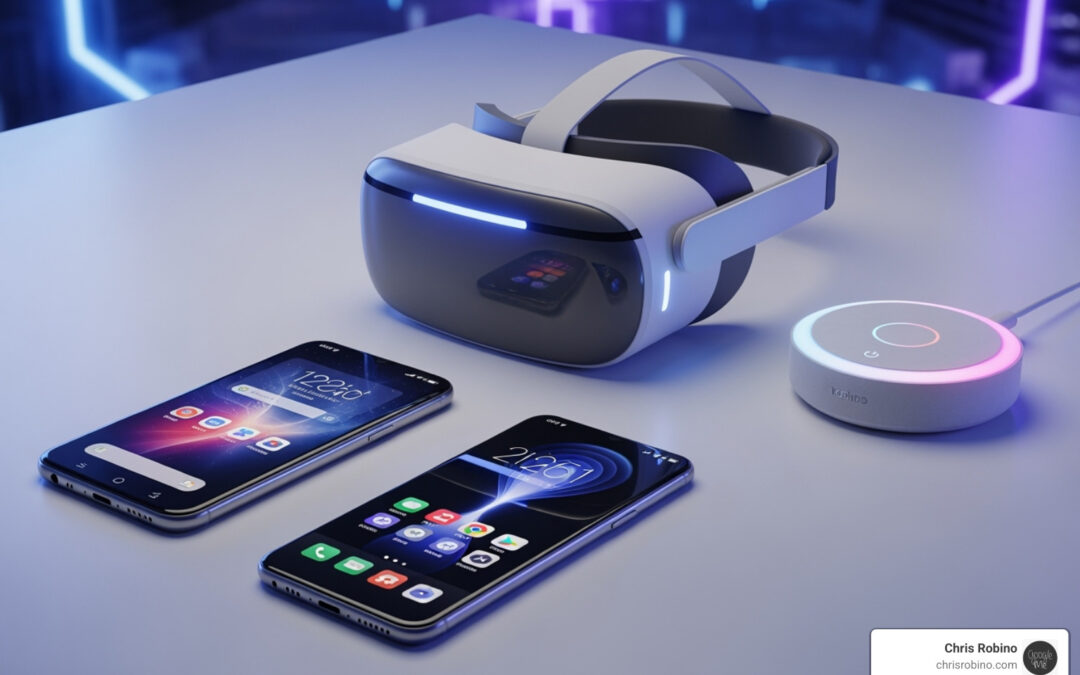The Future is Now: New Tech Trends Shaping 2025
The landscape of new tech 2025 is buzzing with groundbreaking innovations, building on the momentum of technologies that changed how we live and work in 2024. The exciting products that hit the market are giving us a clear glimpse of the near future.
Here are some of the foundational tech trends from 2024 that are shaping 2025:
- AI-Improved Gadgets: Smart glasses now offer “Look and Ask” AI, while the latest smartphones pack advanced AI features directly into the device.
- Immersive Tech: New mixed reality headsets bring digital content to life, and portable 4K projectors turn any space into a cinema.
- Smart Wearables: New smartwatches impress with long battery life, and we’ve seen the showing of highly anticipated smart rings.
- Next-Gen Computers: Laptops powered by new mobile-first chips promise powerful performance and offer significant upgrades.
- Innovative Audio: We’ve seen high-fidelity sound systems and unique open-ear earbuds.
These new technologies are not just gadgets. They are changing industries and creating new job opportunities. For example, 71% of leaders are now more likely to hire a less experienced candidate with generative AI skills. This shows how quickly new tech is becoming essential.
As Chris Robino, a Digital Strategy Leader and AI & Search Expert, I’ve spent over two decades helping organizations leverage innovative technology and strategic digital initiatives. My work involves seamlessly integrating AI-driven systems to lift search performance and drive growth, particularly with the rapid advancements shaping new tech 2025.
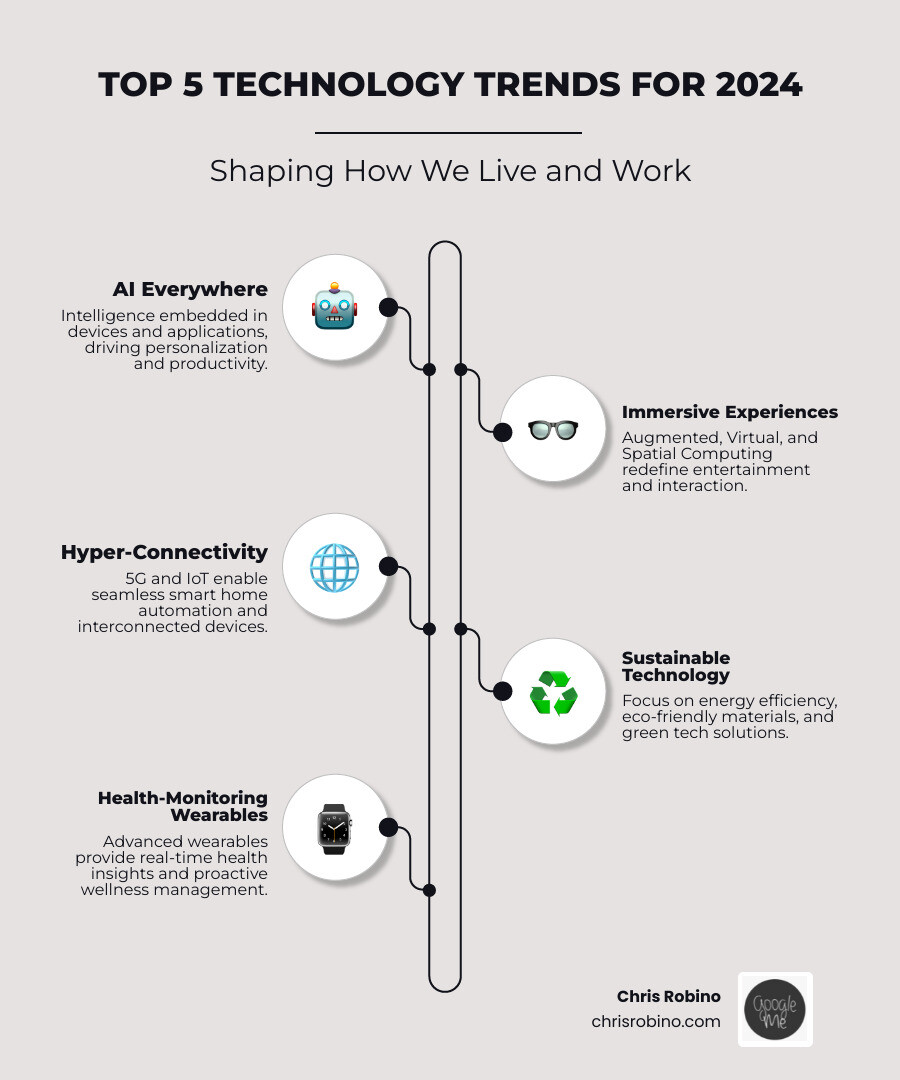
Relevant articles related to new tech 2025:
The Hottest New Tech of 2025: Gadgets Redefining Our World

What makes the technology of 2025 so exciting isn’t just the flashy features—it’s how these innovations are genuinely changing the way we live, work, and play. The new tech 2025 landscape is filled with gadgets that feel almost magical in their capabilities, yet surprisingly practical in their applications.
Think about it: we’re living in a time when your phone can understand context like never before, your home anticipates your needs, and entertainment feels more immersive than ever. According to a recent Work Trend Index, these aren’t just cool toys—they’re reshaping entire industries and creating new opportunities for everyone.
AI and Smart Devices: Intelligence in Your Hands
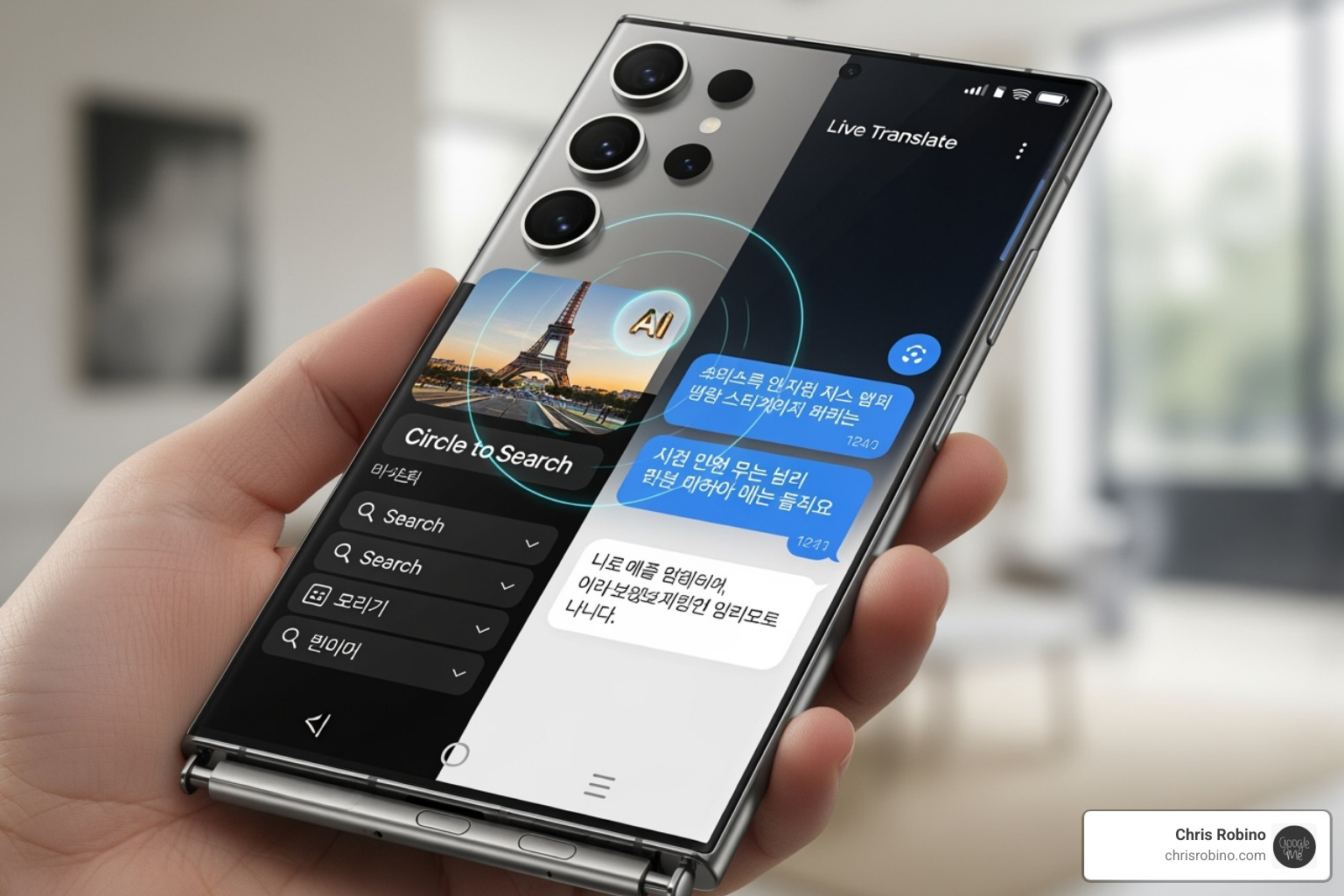
The magic of artificial intelligence is no longer happening somewhere in the cloud—it’s right there in your pocket. What we’re seeing with on-device AI is truly remarkable: your gadgets are becoming smarter, more personal, and incredibly intuitive without needing to phone home for help.
The latest smartphones perfectly demonstrate this shift. These phones don’t just take great photos; they understand what makes a great photo and help you achieve it. The AI features work behind the scenes to improve your communication, spark creativity, and boost productivity in ways that feel natural rather than robotic.
But it’s not just about phones. The voice-activated technology we use daily is becoming genuinely conversational. About 62% of people with smart speakers now feel comfortable shopping through voice commands—a sign that we’re finally reaching that sweet spot where talking to our devices feels as natural as talking to a friend.
Take clever auto-tracking stands, for example. These devices use AI to follow you around during video calls, keeping you perfectly framed whether you’re gesturing enthusiastically or pacing while you think. It’s one of those “why didn’t I think of that?” innovations that makes remote work feel more human.
New smartwatches showcase another brilliant application of smart technology. Some feature a dual operating system that intelligently switches between power-saving mode and full functionality, delivering up to 100 hours of battery life. That means less time tethered to charging cables and more time actually living your life—exactly what personalized technology should do.
Immersive Entertainment and the Future of New Tech 2025
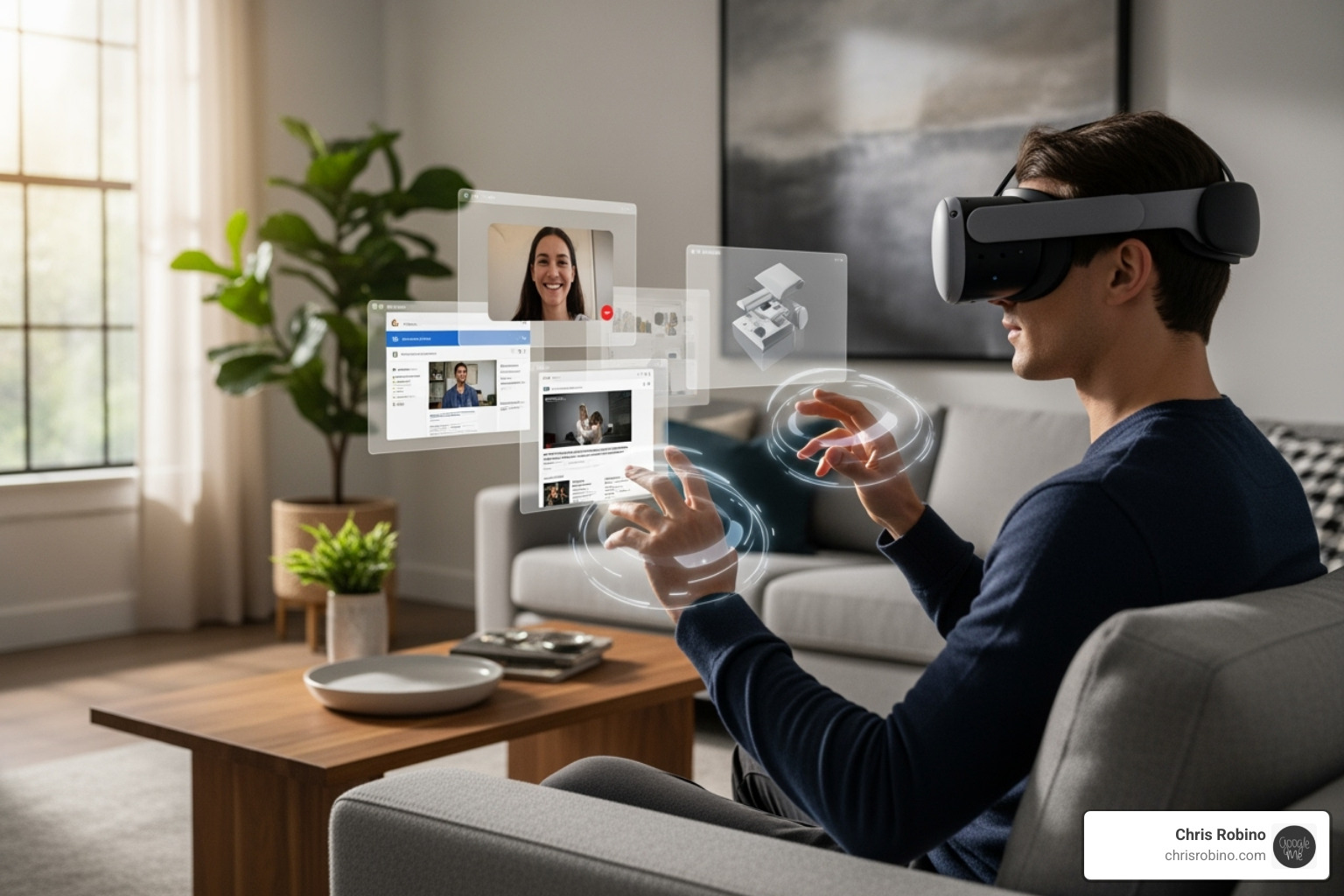
Remember when we thought big-screen TVs were the pinnacle of home entertainment? Those days feel charmingly quaint now. Spatial computing, augmented reality, and virtual reality are creating experiences that don’t just show you content—they place you inside it.
New spatial computing headsets represent a fundamental shift in how we think about digital interaction. This isn’t just a headset you wear; it’s a spatial computer that seamlessly blends your physical and digital worlds. Imagine watching a movie on a screen that fills your entire field of vision, or collaborating with colleagues who appear to be sitting right across from you, even though they’re on different continents.
Gaming technology is pushing these boundaries even further. Advanced wireless gaming headsets transform gaming from something you watch to something you truly experience, with audio so precise you can hear exactly where threats are coming from. For mobile gamers, new mobile controllers can turn any smartphone into a serious gaming machine, bringing console-quality controls wherever you go.
What’s particularly exciting is how extended reality is revolutionizing training and education. Medical students can now practice complex surgeries in risk-free virtual environments. Pilots can experience emergency scenarios without leaving the ground. This technology isn’t just changing entertainment—it’s changing how we learn and prepare for real-world challenges.
The future of entertainment is clearly heading toward experiences that engage all our senses and blur the line between observer and participant. Remote collaboration through these immersive technologies is making distance feel irrelevant, opening up possibilities we’re only beginning to explore.
The Connected Home and Sustainable Innovations
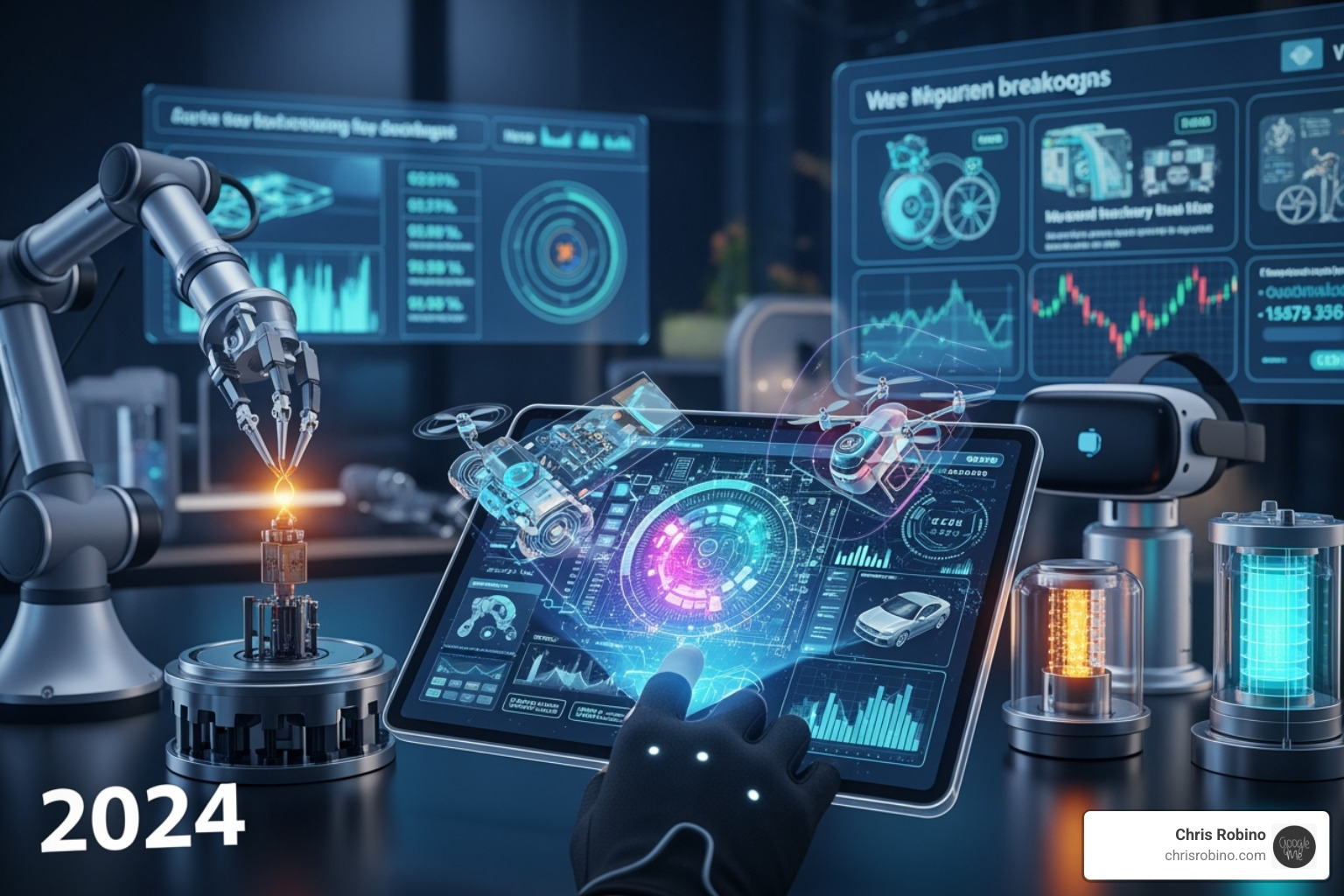
Our homes are getting remarkably smart, but what’s even better is that they’re becoming more sustainable too. The explosion of IoT devices—from 16.6 billion in 2023 to an expected 30 billion by 2025—isn’t just about having more gadgets. It’s about creating homes that think, adapt, and care for both us and the environment.
5G connectivity is the secret sauce making this all possible, delivering speeds up to 20 gigabits per second. This means your smart home automation responds instantly when you walk through the door, adjusting lights, temperature, and security without missing a beat.
New battery-powered doorbells exemplify how security is becoming smarter and more intuitive. Some use a radar sensor that doesn’t just detect motion—it understands the difference between a delivery truck and a raccoon, sending you alerts that actually matter. Meanwhile, innovations like smart wall lights show how even basic lighting can become an art form, projecting beautiful patterns while using energy-efficient LED technology.
But perhaps the most encouraging trend is how manufacturers are embracing sustainable materials and green technology. Eco-friendly earbuds represent this shift beautifully—they deliver great sound while using eco-friendly materials and a case-less charging design that reduces waste. It’s proof that we don’t have to choose between cool technology and caring for our planet.
The bigger picture here is fascinating: as our homes become more connected, they’re also becoming more conscious. Smart grids optimize energy use, intelligent systems reduce waste, and sustainable technology is becoming the standard rather than the exception. This is new tech 2025 at its finest—innovation that makes life better while making the world better too.
How to Prepare for the Tech Revolution of 2025

The whirlwind of innovation we saw in 2024 might feel like trying to catch lightning in a bottle, but here’s the exciting truth: this rapid change is creating incredible opportunities for those ready to seize them. The key isn’t just watching from the sidelines—it’s jumping in with both feet and preparing for what’s coming next.
As we look to 2025, the most successful individuals and businesses will be those who accept lifelong learning and stay curious about emerging technologies. Research on strategic technology trends shows us that the most impactful innovations aren’t just cool gadgets—they’re game-changers that will reshape entire industries and accelerate business success.
The beauty of this tech revolution is that it rewards adaptability over everything else. You don’t need to be a coding wizard from birth; you just need to be willing to learn and grow with the technology around you.
Upskilling for the Future: In-Demand Tech Roles
Here’s some fantastic news: many of tomorrow’s hottest tech careers welcome people from completely different backgrounds. What matters most isn’t where you started, but your willingness to learn new skills and earn the right certifications.
The job market of 2025 is being shaped by the very technologies we’ve been discussing. AI Specialists are becoming absolutely essential as generative AI takes center stage. These roles typically pay between $85,000 and $115,000 annually, and they require skills in machine learning, deep learning, and natural language processing. Most importantly, they need people who understand ethical AI—because with great power comes great responsibility.
Quantum Computing Engineers are another fascinating field opening up. As quantum computing moves from science fiction to reality, these specialists can expect salaries between $127,500 and $147,000 per year. You’ll need to understand quantum mechanics, algorithm development, and specialized programming languages.
With all our data floating around, Data Privacy Officers are becoming crucial guardians of our digital lives. They focus on data governance, cybersecurity, and legal compliance, earning $70,000 to $90,000 annually. It’s a role that combines technical knowledge with legal expertise and genuine care for people’s privacy.
The expansion of 5G networks means 5G Network Engineers are in high demand, designing and maintaining these lightning-fast connections that make smart homes truly smart. These positions pay $75,000 to $95,000 per year and require expertise in wireless communication and network security.
The immersive entertainment we discussed earlier needs creators too. Virtual Reality Developers earn $65,000 to $85,000 annually, while Augmented Reality Designers make $70,000 to $90,000. Both roles blend creativity with technical skills in 3D modeling, game development, and programming.
As our homes and cities get smarter, IoT Solutions Architects are designing the interconnected world around us. They earn $80,000 to $100,000 annually and need skills in network protocols, cloud computing, and data analytics.
The future of transportation belongs to Autonomous Vehicle Engineers, who develop self-driving cars and drones. These roles pay $85,000 to $105,000 annually and combine AI, robotics, and sensor technology. Meanwhile, Advanced Robotics Engineers are creating the next generation of helpful robots for healthcare and personal assistance, earning $80,000 to $100,000 per year.
But here’s something crucial: technical skills alone won’t cut it. The most successful professionals will combine their technical expertise with strong soft skills like critical thinking, problem-solving, adaptability, and creativity. These human skills become even more valuable as AI handles routine tasks.
The Bigger Picture: What’s Next for New Tech in 2025 and Beyond?
The gadgets we’re seeing today are just the beginning. Several frontier technologies are quietly maturing behind the scenes, ready to create even bigger waves.
Quantum computing just had a major breakthrough with a new chip that actually reduces errors as it scales up. This isn’t just academic progress—it’s a giant leap toward practical quantum computers that could revolutionize drug findy, optimize energy systems, and transform cryptography forever.
Digital twins are creating virtual replicas of everything from factory floors to entire cities. Imagine city planners using a digital twin to optimize traffic flow before making real-world changes, or manufacturers testing new processes in a virtual factory first. It’s like having a crystal ball for complex systems.
As AI becomes everywhere, AI TRiSM (Trust, Risk, and Security Management) is becoming absolutely critical. This field focuses on making AI transparent, fair, and accountable—addressing our very real concerns about data privacy, algorithmic bias, and security. It’s the difference between AI we trust and AI we fear.
Advanced robotics is evolving beyond simple automation. Researchers are developing artificial compound eye systems that give robots superhuman vision, enhancing everything from autonomous driving to emergency rescue operations. The goal is robots that can work alongside us as true partners.
Personalized medicine is using your unique genetic makeup, environment, and lifestyle to create treatments designed specifically for you. Instead of one-size-fits-all medicine, doctors will soon prescribe treatments based on your individual biological signature.
Nanotechnology works at the atomic level to create materials and devices we never thought possible. Think ultra-precise drug delivery systems, materials stronger than anything we have today, and electronics so small they’re almost invisible.
The magic happens when these technologies converge. AI accelerates robotics development, quantum computing improves drug findy, and IoT networks make smart cities possible. It’s this interconnected innovation that makes the future so exciting and unpredictable.
Capitalizing on the Future
So how do you ride this wave instead of getting swept away by it?
For individuals, the answer is beautifully simple: stay curious and keep learning. Don’t be afraid to pivot your career or pick up new certifications. The future belongs to people who see change as an trip, not a threat.
For businesses, success comes from strategic thinking and fostering innovation. Look at the technologies most relevant to your industry and explore how forward-thinking companies are already using them. Balance the efficiency of centralized systems with the flexibility of local innovation. Most importantly, make responsible innovation a core part of your strategy—transparency, fairness, and accountability aren’t just nice-to-haves anymore.
At Chris Robino, we specialize in helping organizations steer these exciting but complex changes. We provide the insights and strategies needed to leverage emerging technologies effectively, streamline communication, and access the expertise that drives real growth in our digital world. You can explore more info about emerging tech consulting services to see how we can help your organization thrive.
The future isn’t just coming—it’s already here, knocking on our door with exciting possibilities. New tech 2025 and beyond offers incredible opportunities for those ready to accept change and grow with it. Let’s not just watch this change happen; let’s be active participants in shaping tomorrow.
